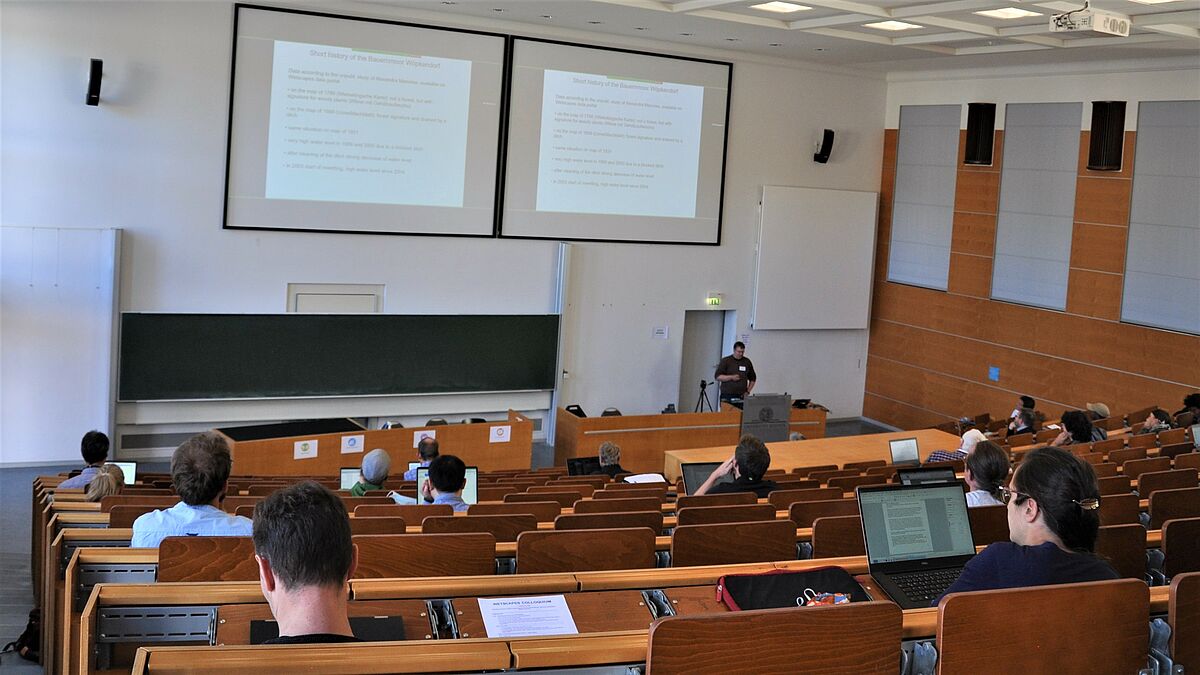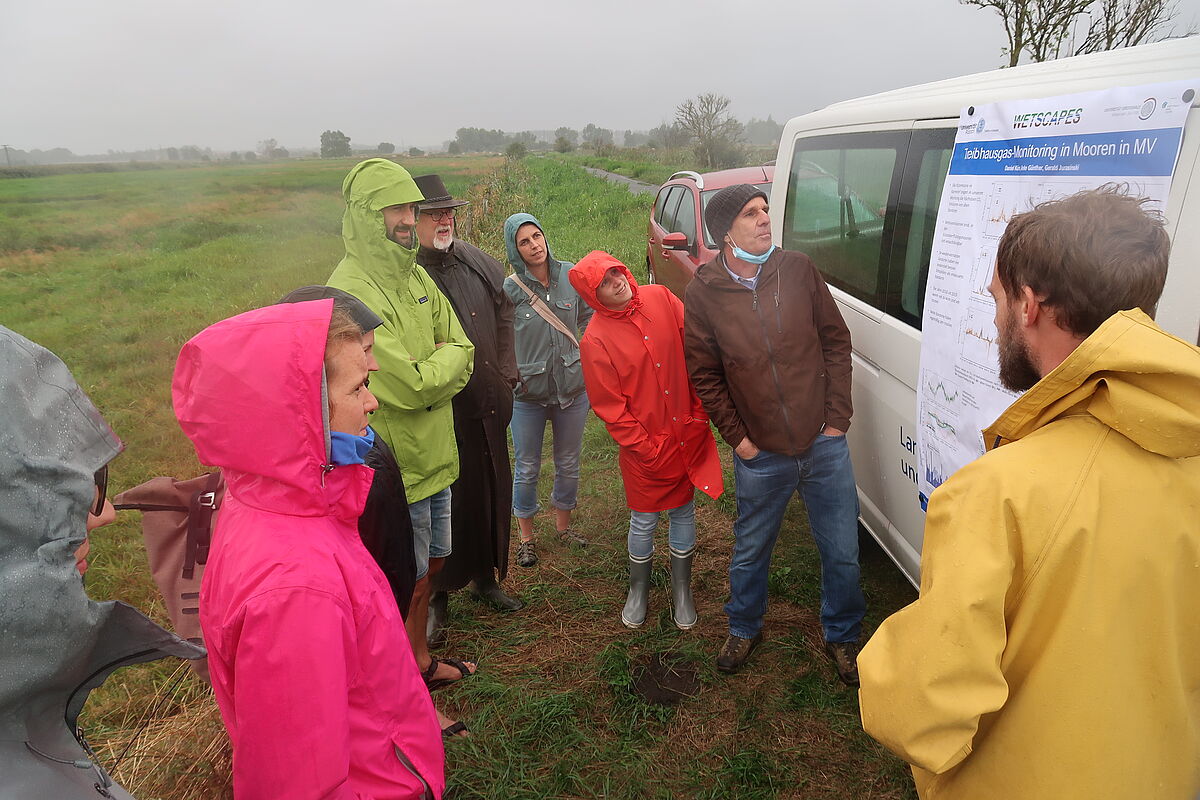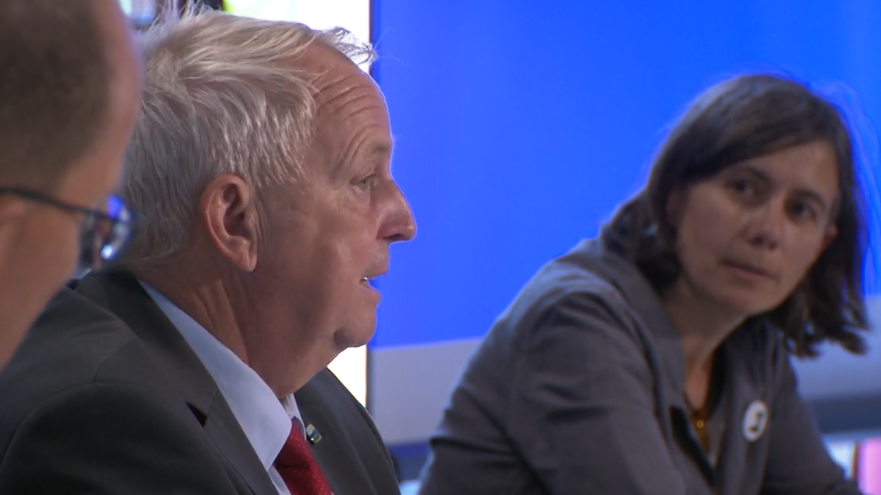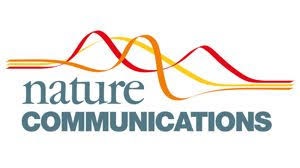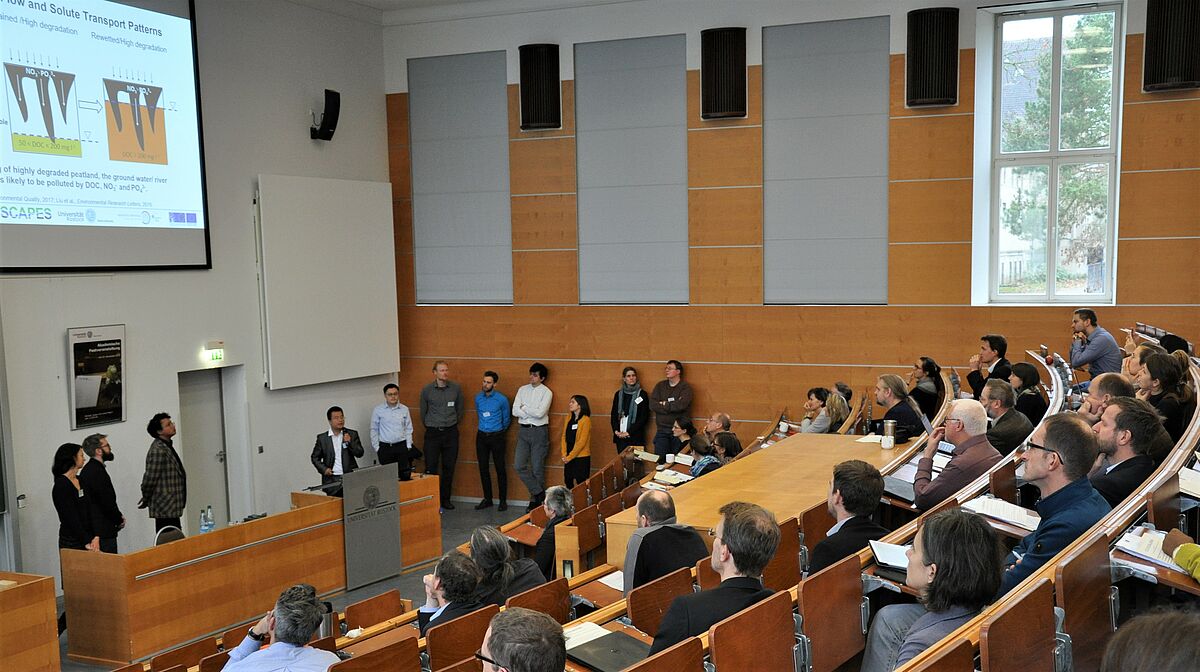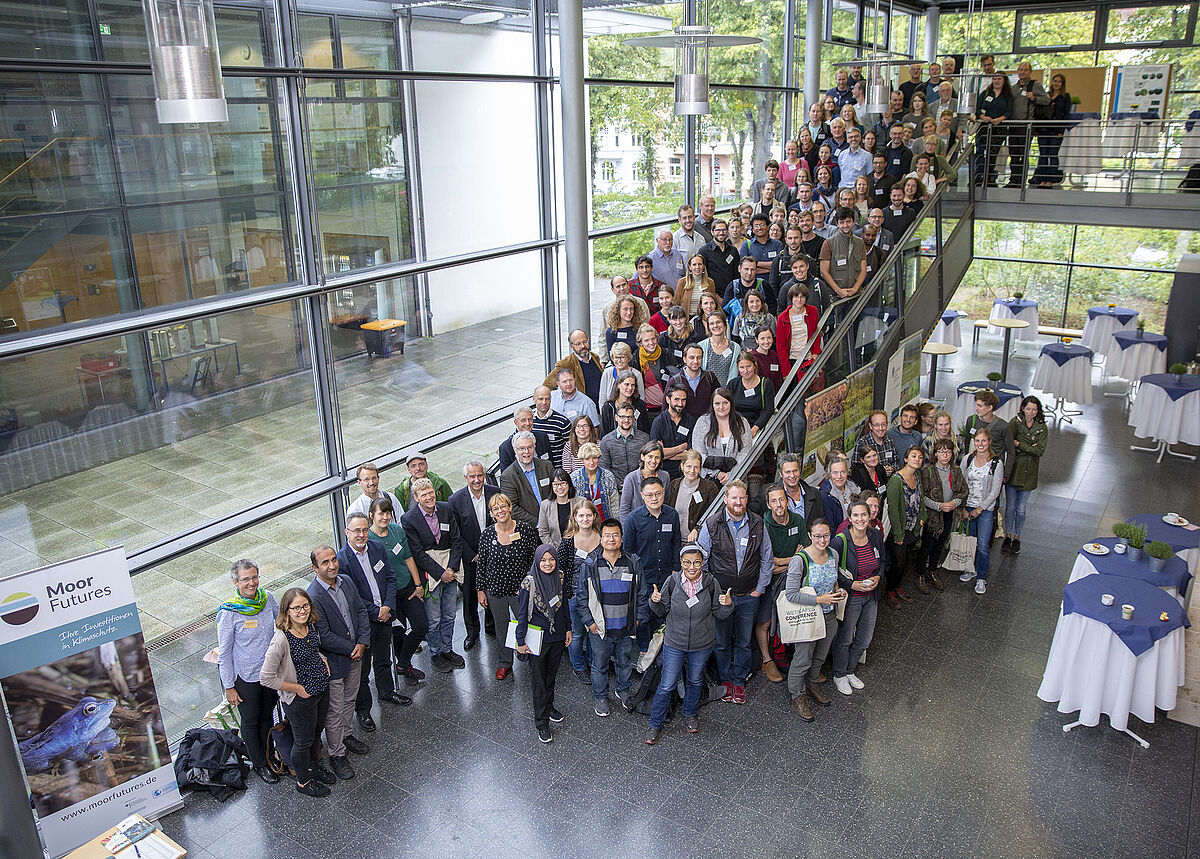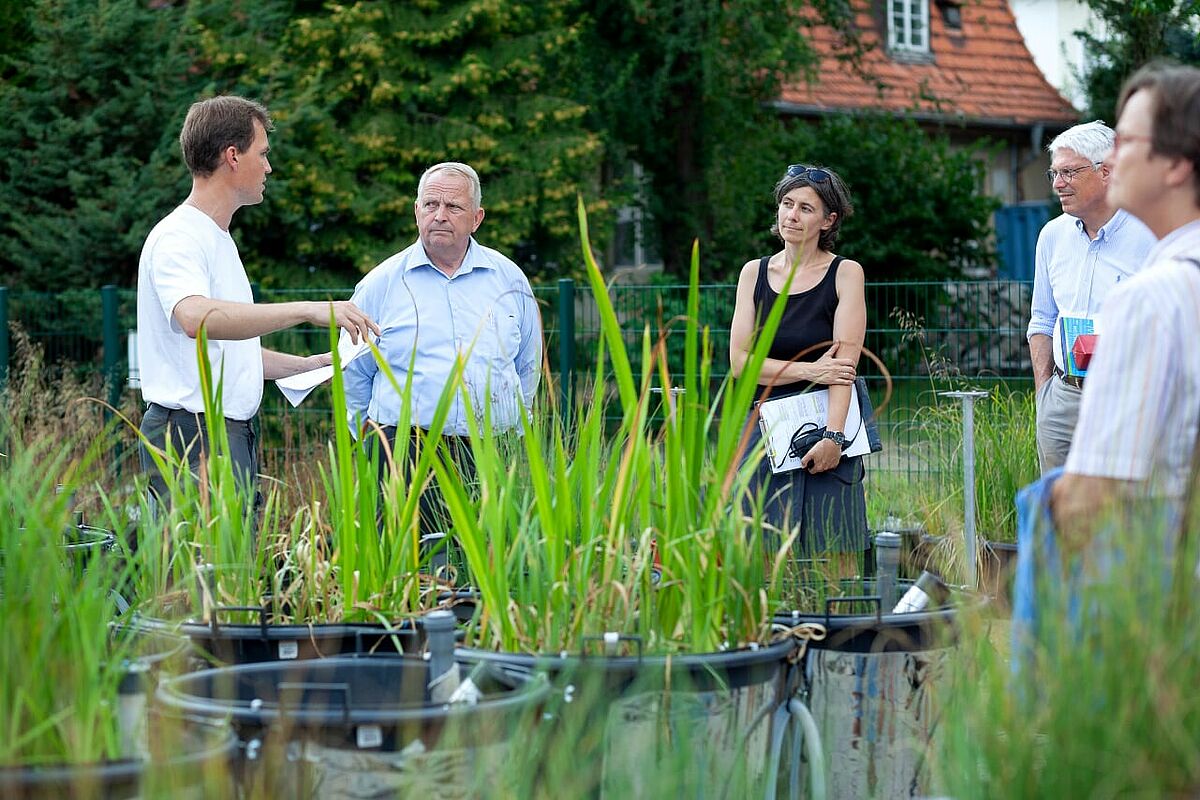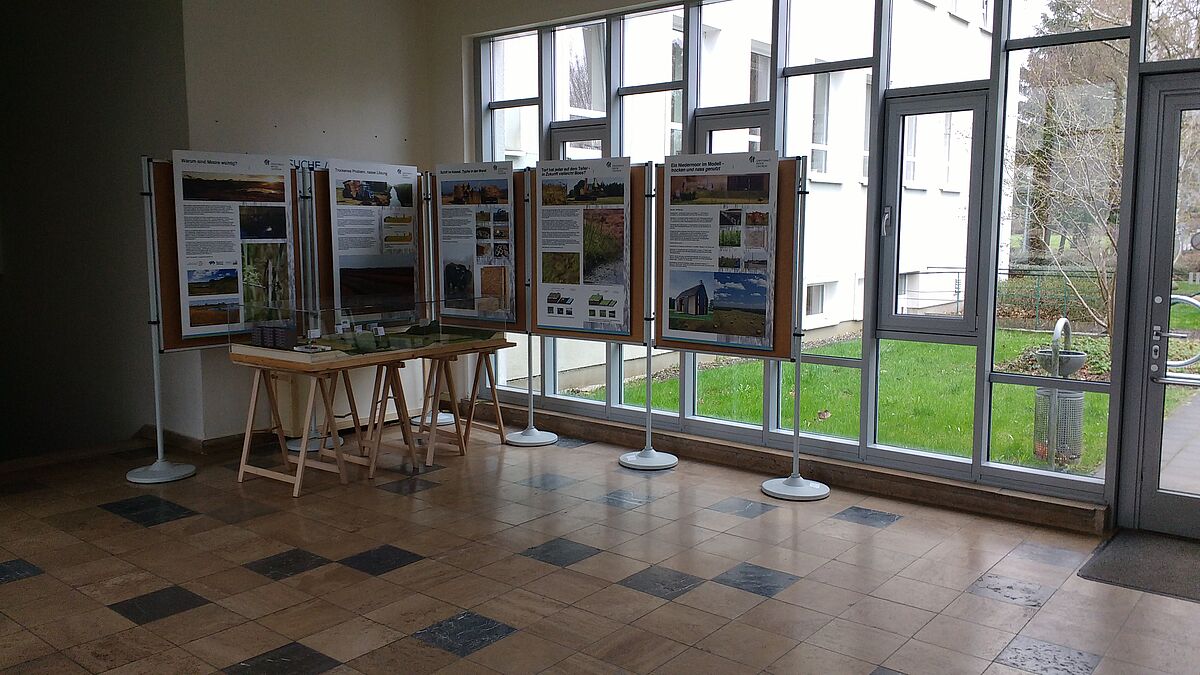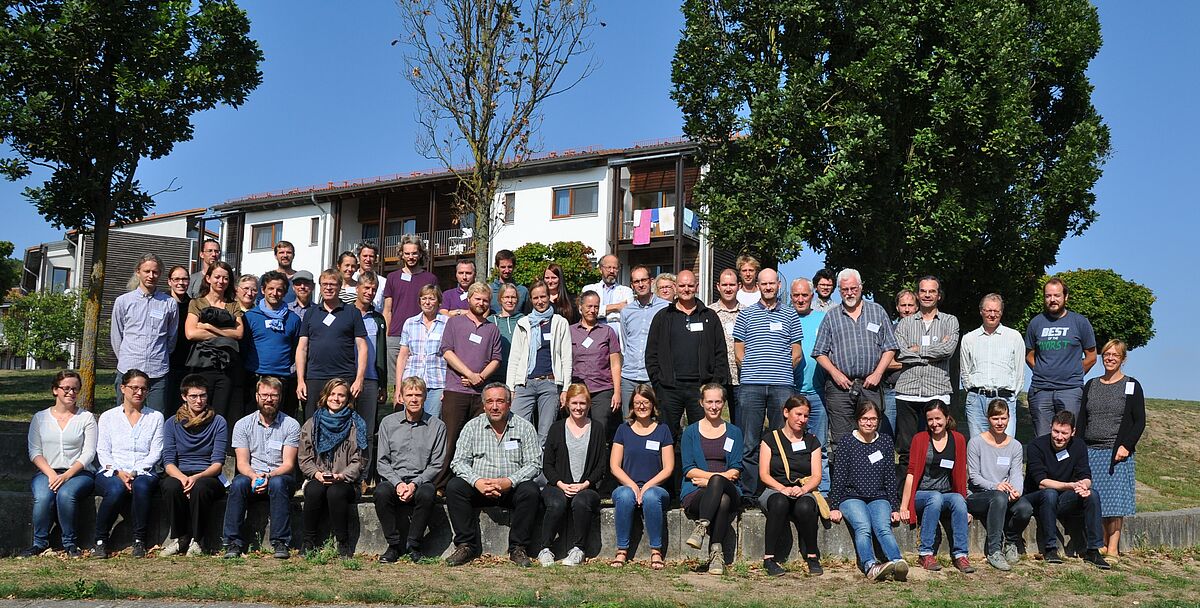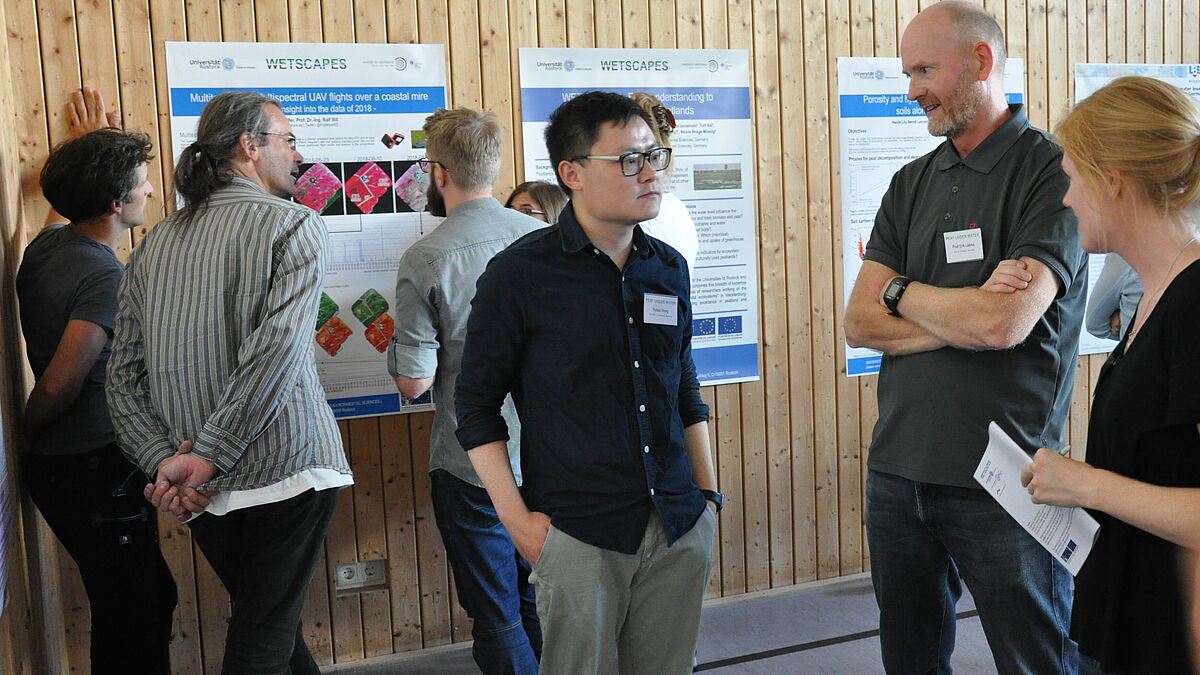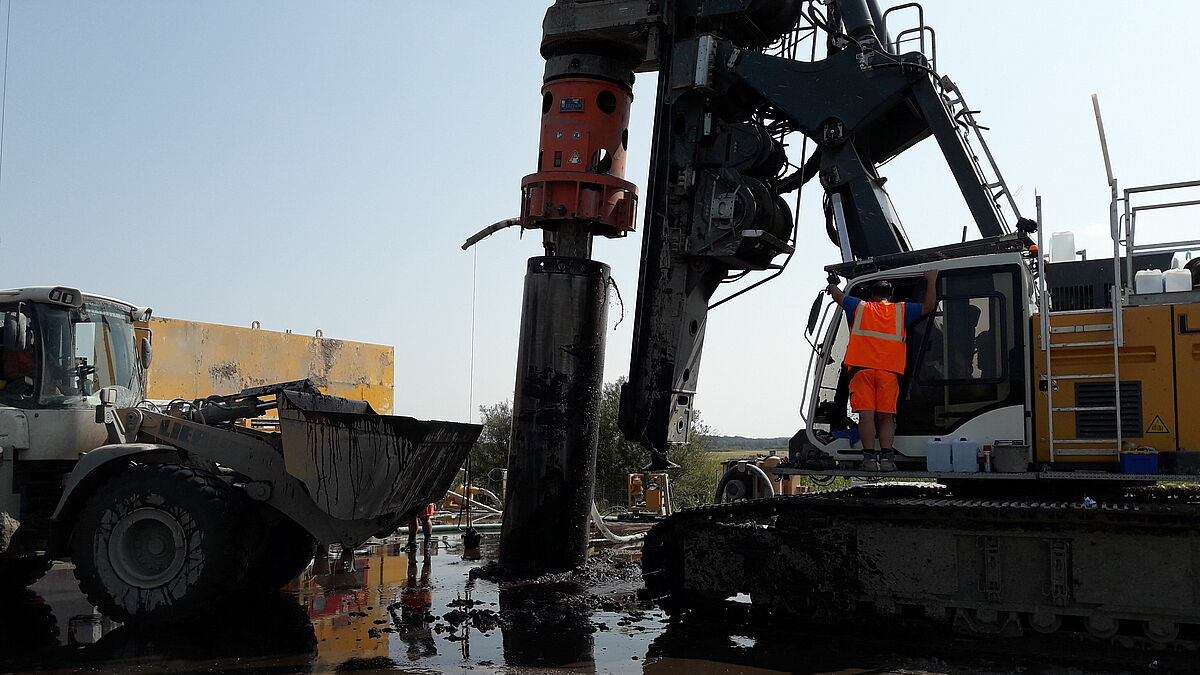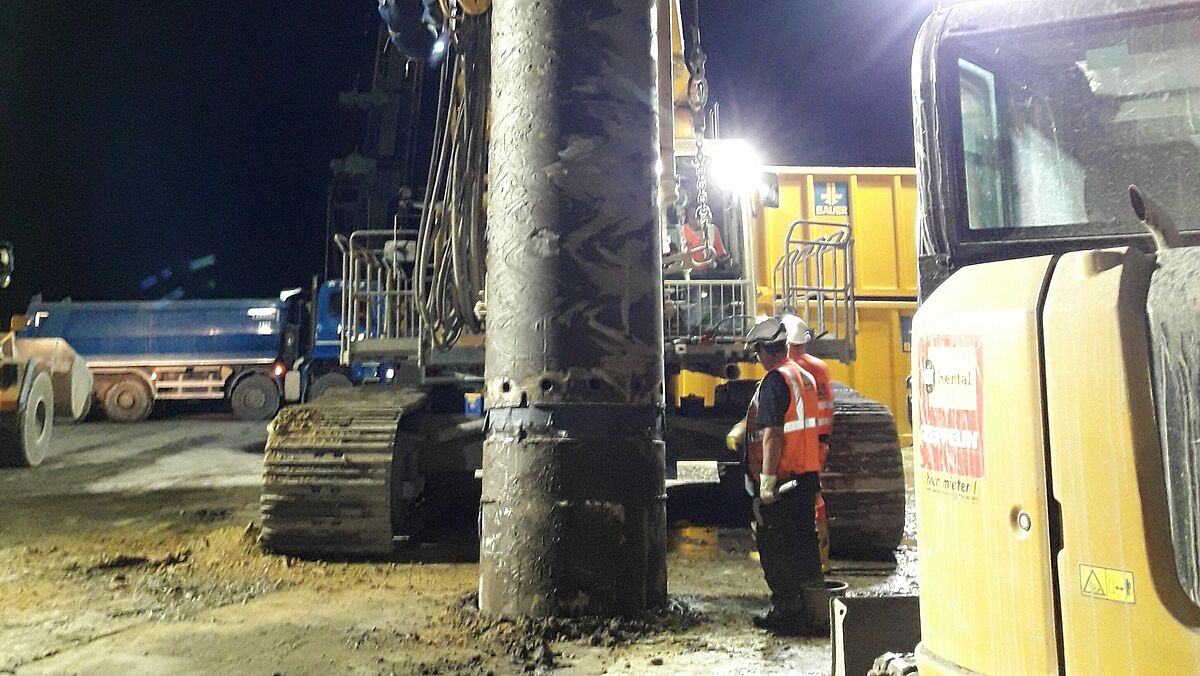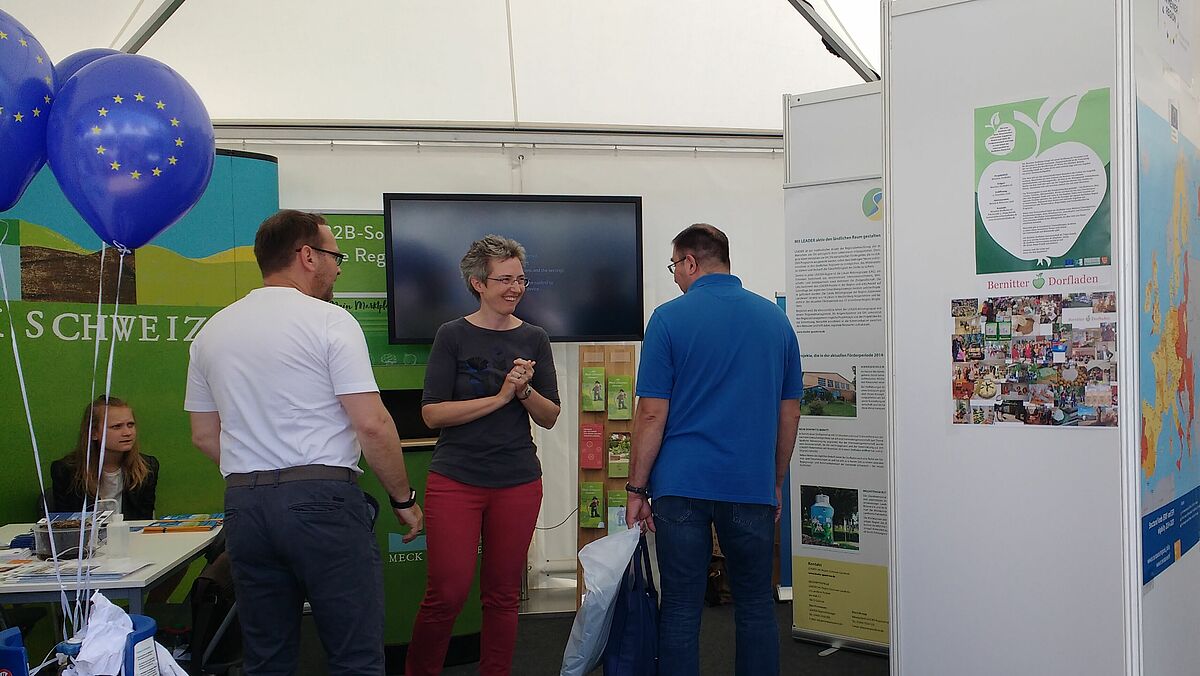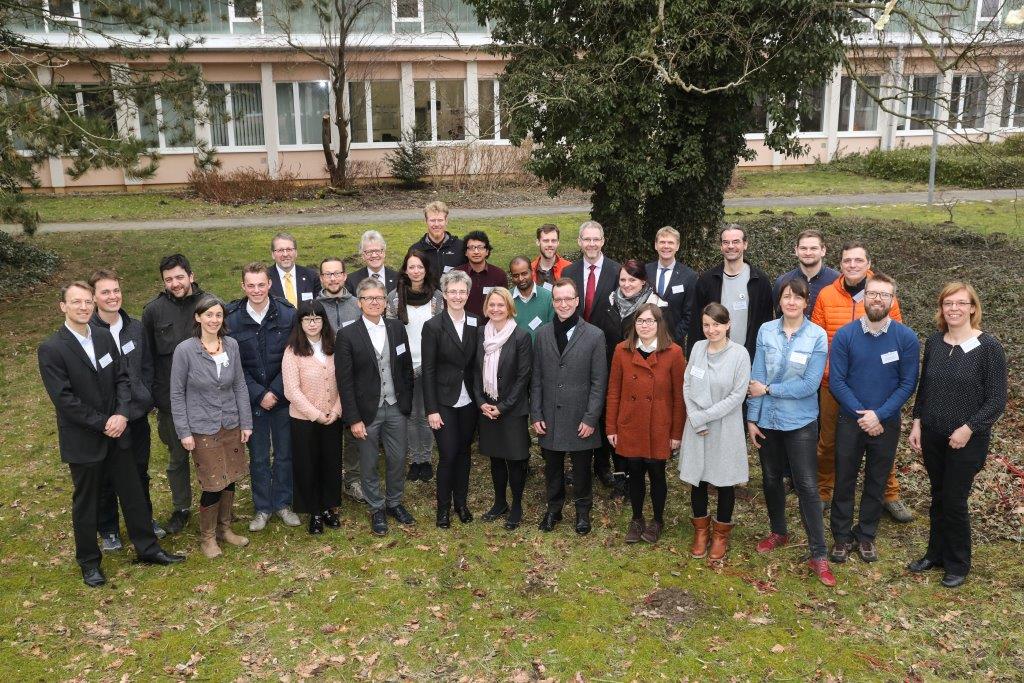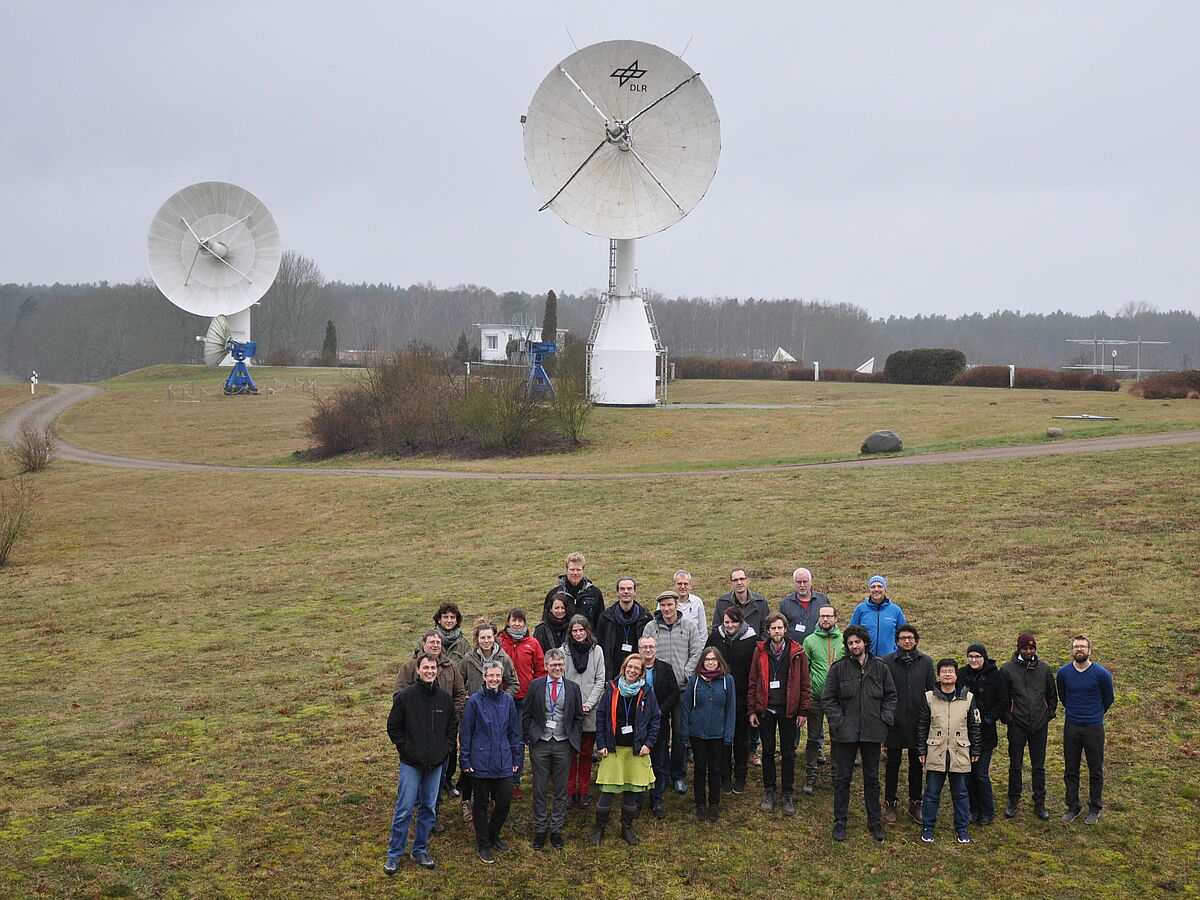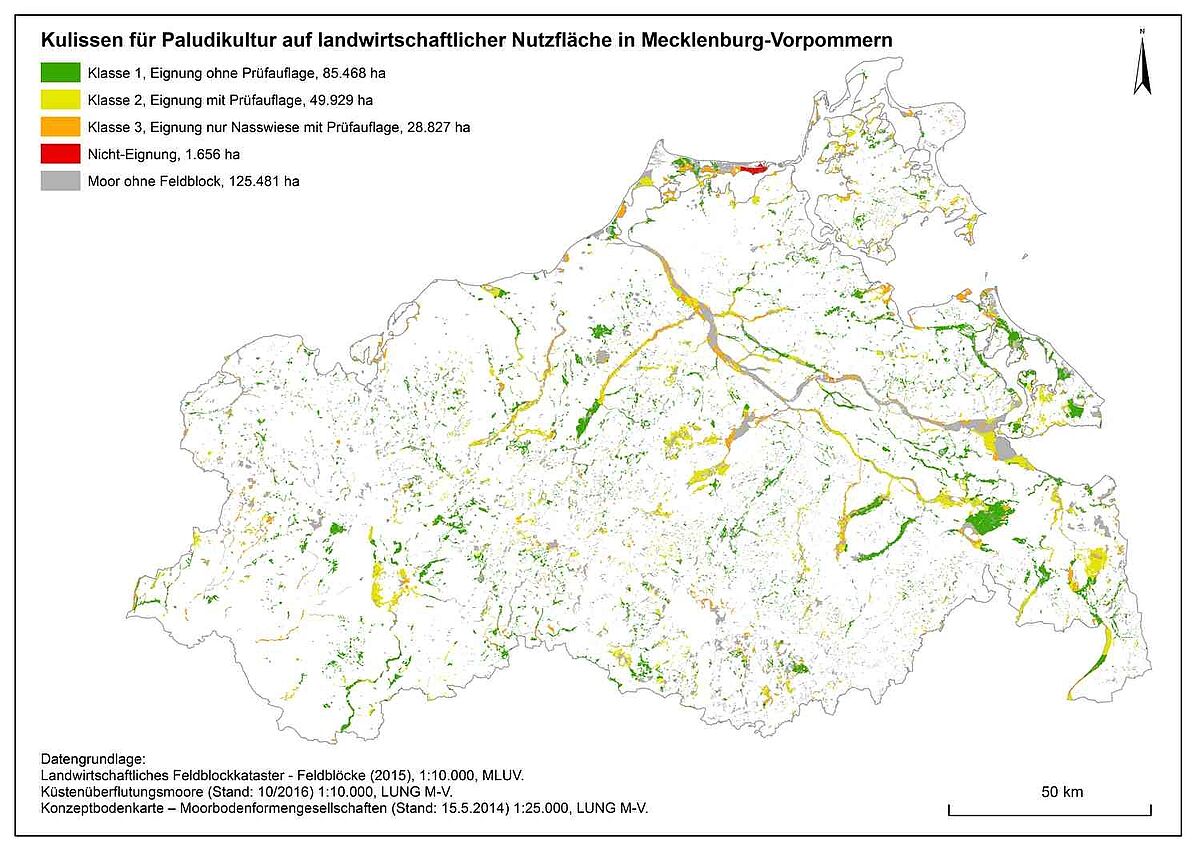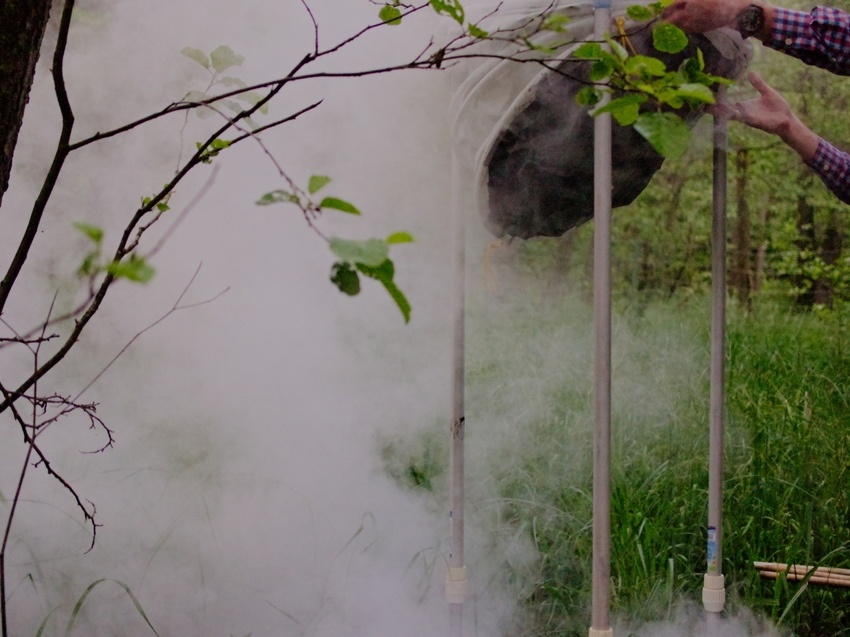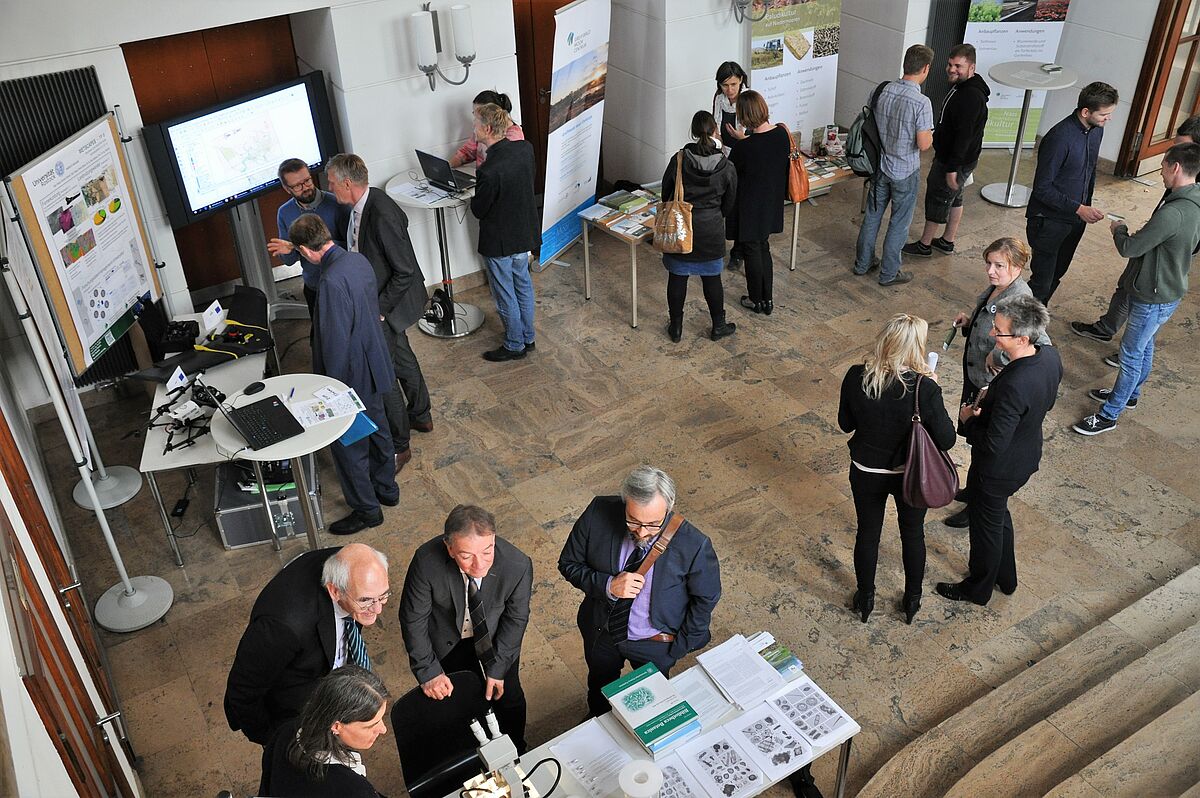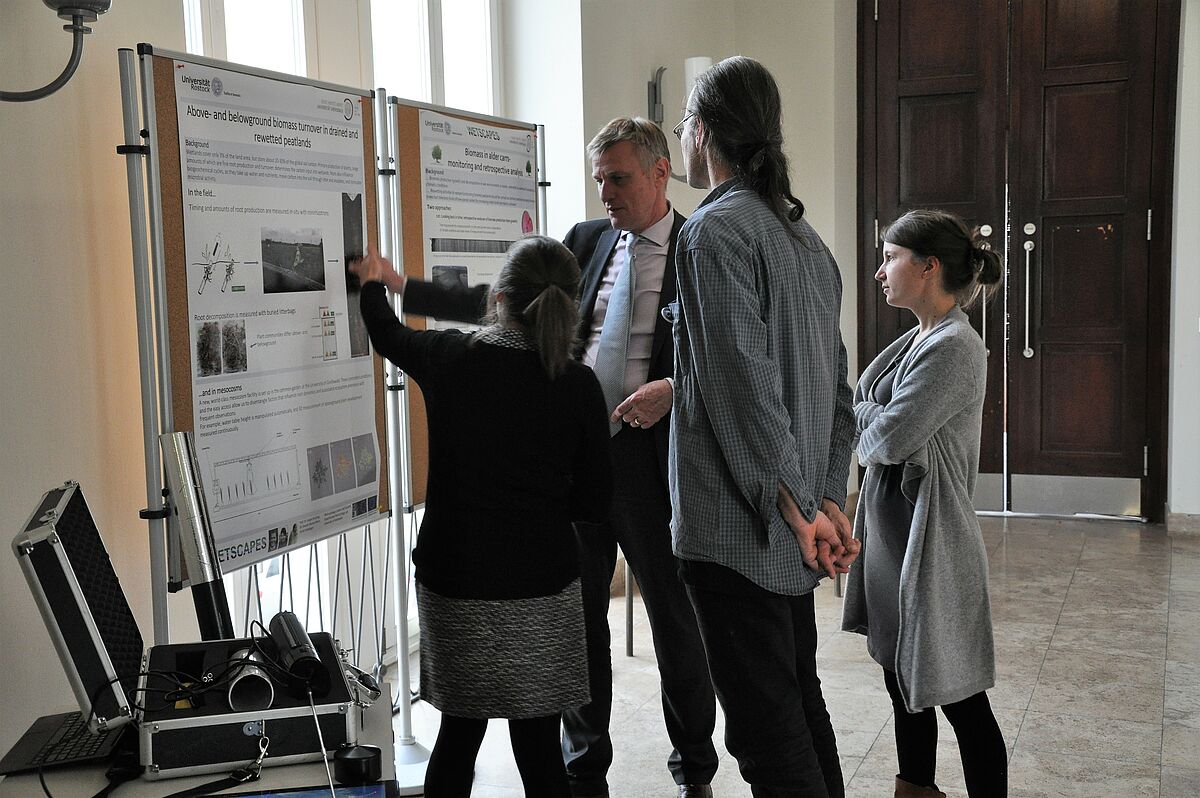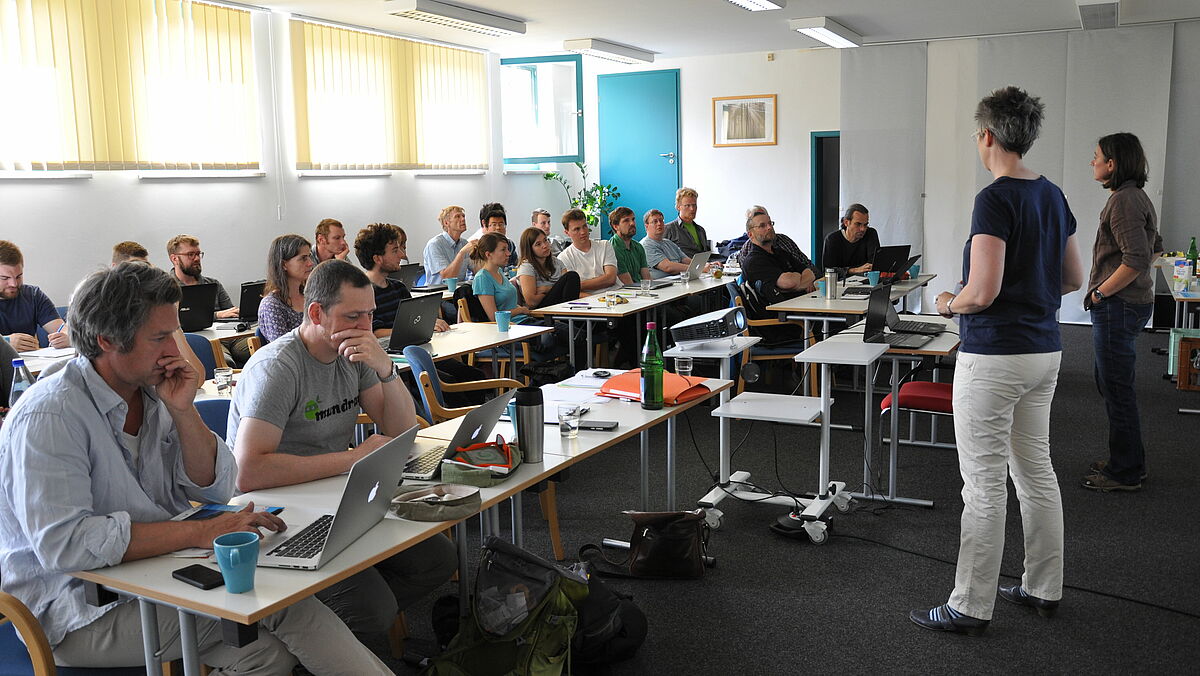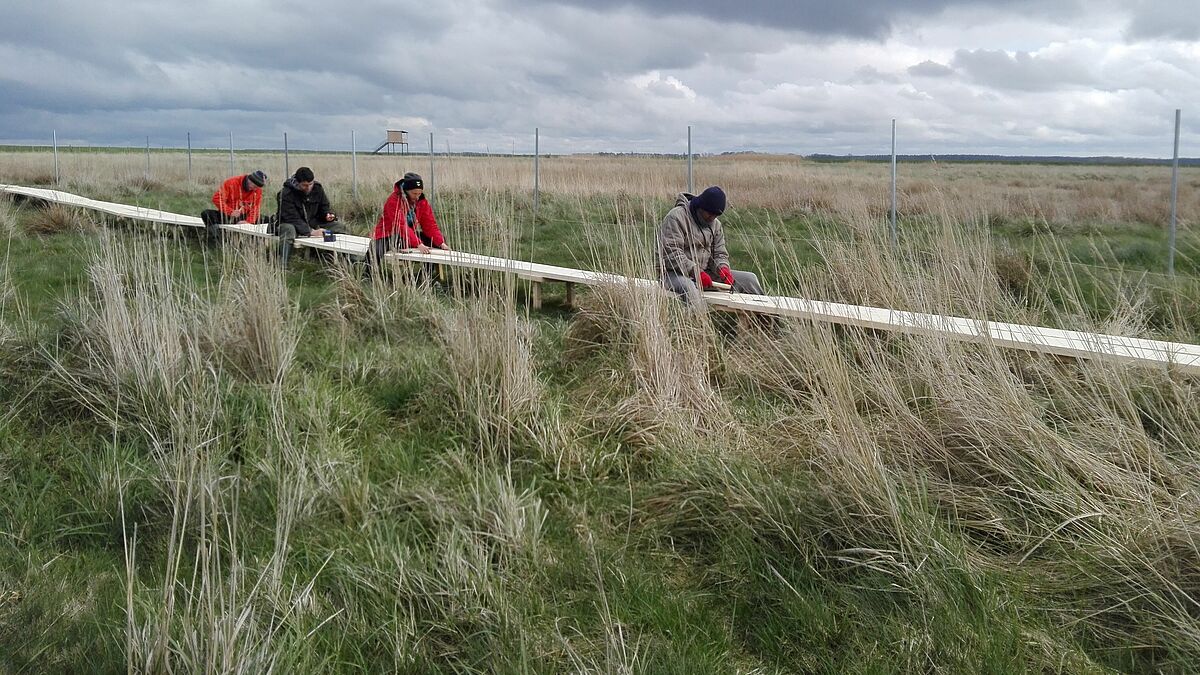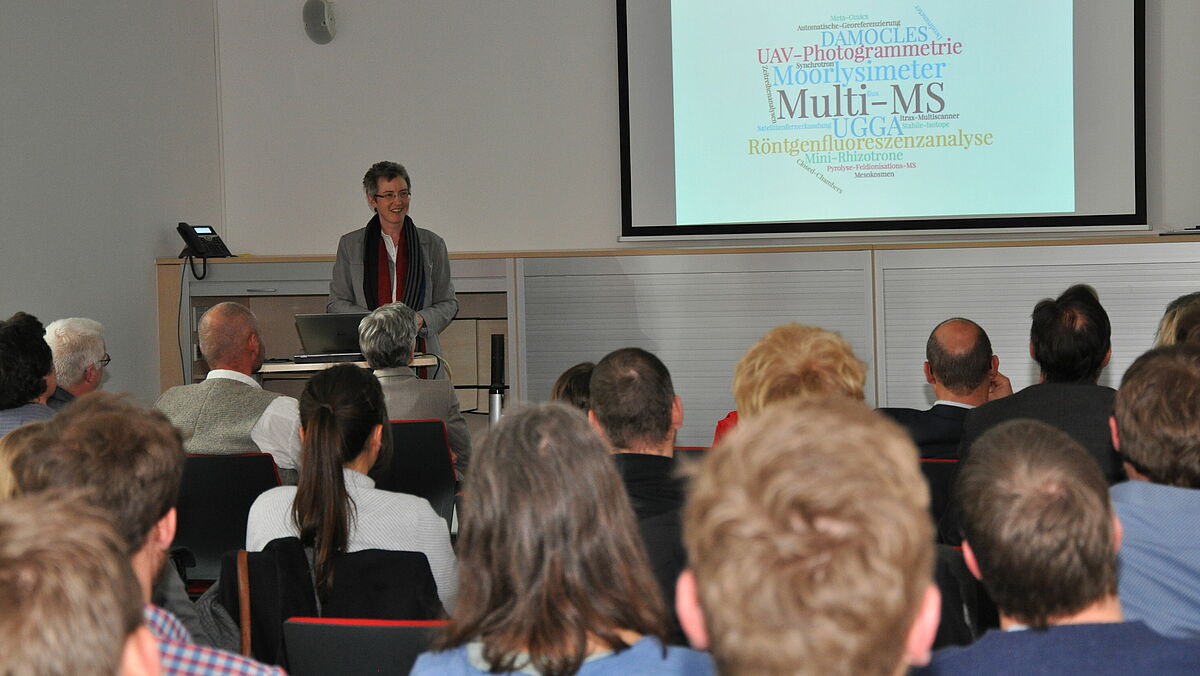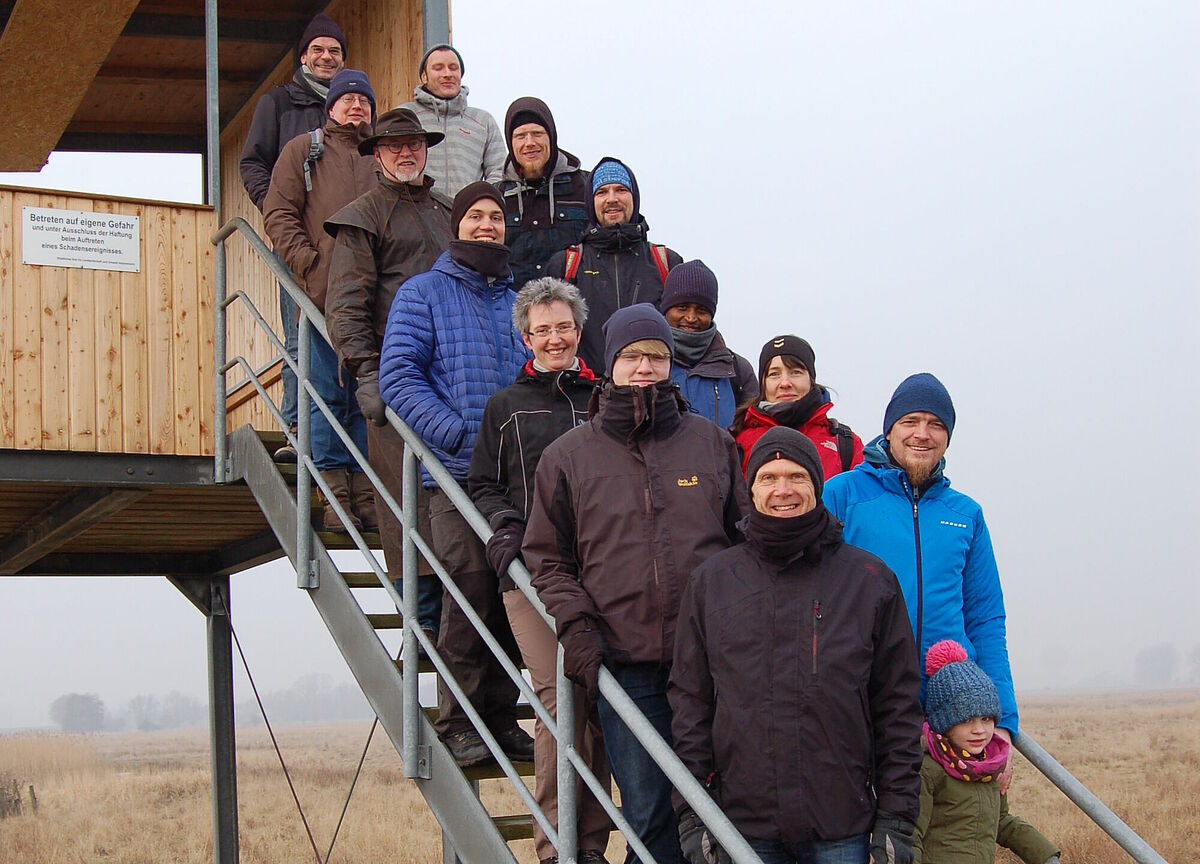September 2020: WETSCAPES Colloquium on future peatland research
In compliance with rules of hygiene and with a mixture of presence and virtual participation, a meeting of members of the current WETSCAPES consortium with scientists from a total of 8 different research institutions took place at the University of Rostock from 7-8 September. The topic was the cooperation in a follow-up project. A concept for the acquisition of a SFB Transregio at the German Research Foundation (DFG) was discussed and further developed. The discussions brought the plans a big step forward.
August 2020: Expertise on peatlands communicated to Greenpeace
On 26.08.20 a delegation from Greenpeace Germany visited the Greifswald Mire Centre with many questions in their luggage. The discussion with staff from the University of Greifswald and the Michael Succow Foundation provided many answers - and of course new questions. Very impressive was the visit of the Karrendorf meadows in the pouring rain. After an introduction to the history of the peatland by Dr. Nina Seifert from the Michael Succow Foundation, Daniel Köhn from the University of Rostock expertly explained the greenhouse gas measurements on the two WETSCAPES research sites. Soaked through and in agreement at the end of the day, everyone agreed that field research sites and direct visits to the peatlands are immensely important for understanding these ecosystems.
July 2020: Backhaus demands to rewet all peatlands in MV
On 28.07.20, Minister of Agriculture and Environment Dr. Till Backhaus and Dr. Franziska Tanneberger, head of the Greifswald Mire Centre and scientist in WETSCAPES, presented the collection of facts "Peatlands in Mecklenburg-Vorpommern in the context of national and international climate protection targets - state and development potential" in a joint press conference. From this paper, which also contains results of the WETSCAPES project, the Minister concluded that rapid steps in the rewetting of drained peatlands are urgently needed to achieve climate protection goals. He also stressed the importance for Mecklenburg-Vorpommern of continuing and strengthening the internationally significant peatland research in the state.
To the press release of the Ministry of Agriculture and Environment (in German).
To the collection of facts (in German).
June 2020: WETSCAPES at the webinar "Peatlands in the new CAP"
On June 3, the Greifswald Mire Centrum, Wetlands International Europe and the National University of Ireland, Galway, hosted the webinar "Peatlands in the new CAP: potential and synergies for sustainable regional economies with climate and biodiversity benefits". WETSCAPES scientists presented their findings on greenhouse gas emissions (this article is on the right). The webinar also presented examples of paludiculture. It also informed about practical and political solutions and how these can be integrated into the new common EU agricultural policy. Some 150 participants followed the presentations and discussions live. The full webinar can be viewed under the following link: https://www.youtube.com/watch?v=VEUDh2PznHc
Please note: Once you watch the video, data will be transmitted to Youtube/Google. For more information, see Google Privacy.
April 2020: Postponement of peatland rewetting would lead to further global warming for centuries
The positive climate effects of peatland rewetting are determined by the long-term saving of carbon dioxide, not by the release of methane. This is shown by researchers of the WETSCAPES project with the article "Prompt rewetting of drained peatlands reduces climate warming despite methane emissions" in the journal "Nature Communications". Rapid action is therefore needed worldwide to rewet peatlands. The longer this is delayed, the greater the climate damage. Full press release here.
November 2019: Evaluation of WETSCAPES
On 26.11.19 the research project WETSCAPES presented its results and was evaluated by the funding agency. Young scientists presented their interim results in talks and poster presentations and discussed with invited experts. Press release here.
September 2019: Peatland must be wet - 160 scientists agree that rapid stop of peatland drainage necessary to achieve global climate protection goals
Peatland must be wet - immediately. This is a summary of the results of the international conference that took place from September 10 to 13, 2019 at the University of Rostock. At the WETSCAPES conference, 160 scientists from 20 countries discussed the results of their research in dehydrated, rewetted and near-natural peatlands. Representatives from various disciplines talked about plant growth, greenhouse gas emissions, nutrient losses and microbial processes in the soil. Most of these scientists deal with individual phenomena in peatlands, and together they were able to establish clear relationships and connections between the results. This is particularly important for rewetted peatlands, as these systems represent completely new ecosystems and the details of their functioning are still poorly understood. Complete report (in German) here.
August 2019: Minister of the Environment MV and Agrarattachés on visit
On August 29, 2019, about 30 agricultural and environmental attachés from 14 countries from Japan to Paraguay, together with Dr. Till Backhaus, Minister of Agriculture and Environment in Mecklenburg-Vorpommern, visited the WETSCAPES research areas in the Karrendorfer Wiesen and the mesocosm facility at the University of Greifswald. The attachés were impressed by the successfully revitalized coastal flood mire, in which the importance of wet peatlands for biodiversity, climate protection and regional development is visible, and by the knowledge gained through extensive measurements thanks to the WETSCAPES project. Minister Backhaus particularly praised the good cooperation between the two universities and the high motivation of the professors and young scientists involved in the project. He regards a continuation of the joint research work on peatlands in Mecklenburg-Vorpommern as very positive and worthy of support.
August 2019: Scientists at the University of Rostock develop new method for estimating greenhouse gas emissions from peatland sites
It is necessary to quantify emissions of climate-damaging gases worldwide in order to be able to forecast climate developments. Laughing gas (N2O) plays an important role here because it is around 300 times more harmful to the climate than CO2. Peatland sites and peat soils are known to be sources of greenhouse gases and nitrous oxide. In previous investigations, chemical soil and peat properties such as the carbon-nitrogen ratio have been used to estimate climate gas emissions. The soil physics working group at the Faculty of Agricultural and Environmental Sciences at the University of Rostock has now for the first time used the physical properties of peat soils as a basis for calculations. More information and the link to the original publication here.
March 2019: Exhibition "Peatland, Climate Protection and Paludiculture"
The exhibition "Peatland, Climate Protection and Paludiculture" of the Greifswald Mire Centre can be visited on the ground floor of the Faculty of Agricultural and Environmental Sciences of the University of Rostock. The exhibition shows the problems of peatland use to date and the solution to the preservation of wet surfaces in texts, pictures and a model. Until 24 April 2019, staff and students can view the exhibition in the area in front of Seminar Room 1, after which it will be shown in part at the Long Night of Science as part of the information stand of the Chair of Grassland and Fodder Sciences.
September 2018: International workshop „Peat under Water“ on rewetting of peatlands
On September 5th to 6th, more than 50 scientists discussed in Salem at the Kummerower lake about the ecology of rewetted peatlands. The workshop that was organized as part of the WETSCAPES project by the Universities of Rostock, Aarhus and Greifswald, the German Research Centre for Geosciences (GFZ) and the Leibniz-Centre for Agricultural Landscape Research (ZALF) attracted experts of peatland research from nine countries. If you like to get more information, please contact wetscapesuni-rostockde. To the press release.
August 2018: Peat from A20 construction site for mesocosm experiment
At the major construction site of the A20 motorway, which collapsed over the peatland near Triebsees in 2017, 23m deep boreholes are currently being dug underground. These holes shall later be filled with concrete and support the new bridge. Large quantities of peat come to light during drilling. Since our large mesocosm experiment is currently being set up at the University of Greifswald, the 108 vessels with a volume of 100 litres each can be filled with peat from the construction site. Thanks to the friendly support of the State Office for Road Construction and Traffic and the workers on the A20 construction site, the peat from Triebsees is now used in WETSCAPES and the use of commercially mined peat can be dispensed with.
May 2018: WETSCAPES presents itself at the campaign "Europe in my region"
WETSCAPES was chosen as project to be presented at the campaign "Europe in my region. Firstly, Prof. Nicole Wrage-Mönnig represented Mecklenburg-Western Pomerania at the launch event in Hanover, the "Pitch your Project-Award". Furthermore, WETSCAPES was introduced at the MV-Day at Pentecost in Rostock. Many interested people came to us at the "Neuen Markt". Children got magnifying cups for their own research. More pictures, the video of the presentation and information about this campaign here.
April 2018: First Status Seminar at the University of Greifswald
One year ago the research project WETSCAPES, a joint project of the Universities of Rostock and Greifswald, started. 21 young scientists and numerous students are now working with great enthusiasm on the goal of researching scientific principles for sustainable management of peatland. In our status seminar on April 18, 2018, first results from the individual working groups were presented to the public. About 70 people took part at this seminar at the University of Greifswald.
March 2018: Minister of Education visited WETSCAPES
On March 23th, 2018, the Minister of Education, Science and Cultur of Mecklenburg-Wetsern Pomerania visited the WETSCAPES project. During a research trip to all five consortia funded by the state's excellence research programme, Mrs. Hesse informed herself about the research questions in WETSCAPES. The young scientists presented their research in the peatland with posters and technical devices as well as samples. At the same time, Thomas Krüger, leader of the SPD parliamentary group in the state parliament, also gained an insight into the work of the scientists at the universities of Greifswald and Rostock. He has long been committed to paludiculture, i.e. the agricultural and forestry use of rewetted moorland sites, and was therefore enthusiastic about the WETSCAPES project, which is developing the scientific basis for paludiculture. Mrs. Hesse concluded: "I was impressed how many young scientists work together with older scientists. I sensed how enthusiastic research is going on here at WETSCAPES."
January 2018: WETSCAPES colloquium with cooperation partner DLR
On 31th January the third colloquium of WETSCAPES took place at the German Aerospace centre (DLR) in Neustrelitz. After an introduction into the technique to receive, archive and apply data at the DLR, we had fruitful discussions concerning past and future project progression, this time with the main focus on remote sensing.
December 2017: Presentation of paludiculture strategy in Mecklenburg-Western Pomerania
The Minister of Agriculure and Environment Till Backhaus presented the paludiculture strategy at a state press conference on 12th December and demanded a national program to protect mires. The strategy was worked out under the leadership of Greifswald Mire centre by the State Research Institute for Agriculture (LFA), the Universities of Greifswald and Rostock, the farmers`association, Landgesellschaft and further partners. To the press release.
October 2017: This is not a peat fire
We performed a basic test for airtightness of our greenhouse gas chambers in the field. Field testing has the advantage that we can assess the tightness of the whole system (chamber, collar, sealing) at once and under realistic conditions. As suggested by Hoffmann et al. 2017, we used smoke from a cartridge as indicator for gas leakage. This worked unexpectedly well and we even found a small leakage around an incorrectly installed plug in the lid of one chamber, visible by a thin whisp of white smoke. Fortunately, this leakage could be fixed very easily. Since the smoke cartridge test is very fast and easy (and fun…), we plan to repeat it each time the chambers or collars are modified to ensure airtightness throughout the study period.
October 2017: Presentation of the excellence project WETSCAPES to representatives of the EU
Am Dienstag fand an der Agrar- und Umweltwissenschaftlichen Fakultät der Universität Rostock eine Projektbesichtigung des Verbundprojektes WETSCAPES statt. Herr Egbert Holthuis von der Generaldirektion Beschäftigung, Soziales und Integration der Europäischen Kommission und Vertreter der Ministerien für Bildung, Wissenschaft und Kultur sowie für Wirtschaft, Arbeit und Gesundheit des Landes Mecklenburg-Vorpommern erhielten einen Einblick in die Arbeit der Wissenschaftler an den Universitäten Rostock und Greifswald. In Vorträgen, Posterpräsentationen und anhand vieler praktischer Demonstrationen zeigte sich zum einen die enorme Bedeutung dieser Forschung für Klimaschutz und Wirtschaft als auch die Vielfalt der verwendeten Methoden.
Nachdem die Gäste aus Brüssel und Schwerin viele angeregte Diskussionen mit jungen Forschern führten und Einblick in ein modernes Forschungslabor erhielten, zog Herr Holthuis das Fazit, dass das spannende Thema Moorschutz und Paludikultur noch viel zu wenig bekannt ist und daher demnächst durch die WETSCAPES-Wissenschaftler in Brüssel vorgestellt werden soll.
Winter semester 2017/18: Interdisciplinary lecture series „AgriCoast - Nachhaltige Ressourcennutzung in küstennahen Agrarlandschaften“ at the University of Rostock
Time: 15.15 - 16.45 pm, Site: Lecture hall JLW8-HSL, Justus-von-Liebig-Weg 8, 18059 Rostock
23-Oct-2017: Moore – die nasse Notwendigkeit der Nachhaltigkeit, Prof. Dr. Hans Joosten, University of Greifswald, Institute for Botany and Landscape Ecology, more information about the presentation
06-Nov-2017: WETSCAPES – Vom Verstehen zur nachhaltigen Nutzung unserer Moore, Prof. Dr. Nicole Wrage-Mönnig, University of Rostock, Chair of Grassland and Fodder Sciences, more information about the presentation
20-Nov-2017: Biodiversität & Stabilität - Sind diversere Ökosysteme stabiler gegenüber Umweltänderungen? Prof. Dr. Jürgen Kreyling, Ernst Moritz Arndt University of Greifswald, Institute for Botany and Landscape Ecology, DFG-Heisenberg Professorship for Experimental Plant Ecology
18-Dec-2017: Nutzung von Fernerkundungsmethoden zur Charakterisierung von Moorstandorten, Dr. Erik Borg, DLR/DFD Nationales Bodensegment Neustrelitz, more information about the presentation
April 2017: Kick-Off
The official kick-off event took place on 19th April in Rostock. After greetings of the rectors of Greifswald, Prof. Weber, and Rostock, Prof. Schareck, as well as Mr. Venohr from the Ministry of Eduction, Science and Culture Mecklenburg-Wetsern Pomerania, the participants gained an insight into the importance of peatland research by Prof. Joosten. Finally, Prof. Wrage-Mönnig presented the aims of the project WETSCAPES.
April 2017: Settling sampling sites
On the 5th of April the Wetscapes consortium spent an animated field day visiting the first five of the future study areas (drained and rewetted coastal inundation peatland, drained and rewetted alder carr, rewetted percolation mire) and settling the final location of the sampling sites. A few days later a slightly smaller group also finalized the sampling location for the drained percolation mire site. Since these locations represent the main investigation objects for the next four years, it was important to choose sites that suited the purposes of all Wetscapes groups. We especially checked peat properties by coring the uppermost soil layers, since processes in the peat are the main focus of the Wetscapes project. After this very satisfying field site scouting, we are now looking forward to getting the first installations out in the end of April.



